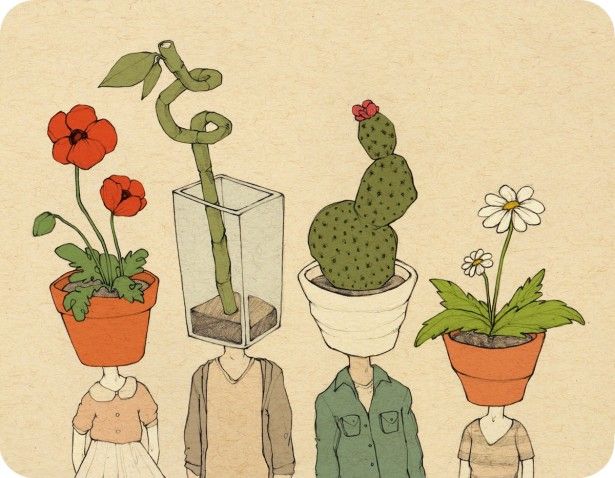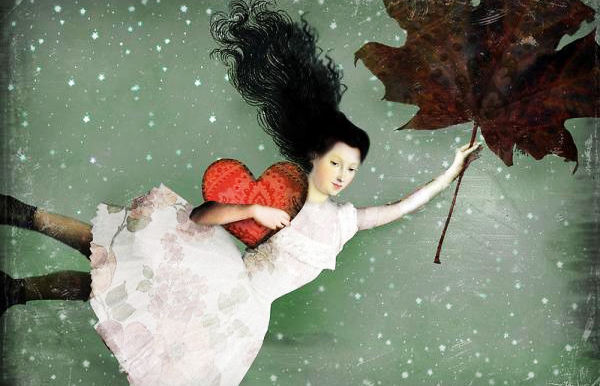empathy
Dear Vegan People: Plants Can Feel Too, Don’t Be Hypocrites

Artwork by Rose Wong
Today, a vegan friend told me he had recently eaten some “ethically-raised lamb” at a farmer’s market in Toronto. He was mostly curious and interested as to how he might proceed with his food choices in the future, if he were to change his diet. Despite the assurance of ethically-raised meat, the lamb “did nothing” for him, he told me, and that he was even a little sore in the belly afterwards.
He said he would be staying vegan for the time being, and was left feeling somewhat satisfied with his choice – that the sustenance of his life would not have to be hinged on the death and killing of animals. I mentioned the example Ken Wilber gives in regards to his late wife, who decided she would eat what she could (foreseeably) have the capacity to kill. In general terms, Wilber says, most people who make such decisions scroll down the food chain to find the animal with which they might feel most comfortable killing, and anything above that animal is out of the question.
A question beckons: is being comfortable killing something a pre-requisite for eating it? Let’s come back to that shortly.
Most people who ask themselves what animals they could kill, Wilber says, scroll down the human-crowned food pyramid and stop somewhere around fish and seafood. For those who feel unable to kill animals on this scale are generally considered vegetarians or vegans. The food chain, here, is based on depth (or consciousness), generally attributed to awareness and neurological carrying capacity. Traditionally, we move down from humans to other primates, to other mammals, to perhaps birds and amphibians & reptiles, to fish and other sea creatures. And then we get to plants.
The discussion went on like this for awhile, in conversation and general agreement about this scale of depth, and that my friend’s ethics and morals would remain strong if he maintained and justified the idea that his diet was reducing the suffering of animals and overall environmental degradation of the planet.
But what about the plants? It is beyond a scientific fact that plants not only know when they are being removed from their roots, but they can ascertain when such a thing is happening to nearby plants. And so this statistic, which is merrily touted by fake carnivore humans, is brought to light. But on this line, we can agree and understand that plants have less depth than animals. Therefore, on an ethical level based on depth, it is better to save the “more conscious” beings’ lives than it is the plants’, and therefore ethical and just to maintain a plant-based diet.
The problem of depth, I tell my friend, is in the word itself. It assumes humans are looking “down” the food chain, linearly. Because when we look at scales of depth such as the one Wilber refers to, we are not just saying that we are “saving” animals by removing suffering from the equation, we are saying that the very things we choose to nourish us, the plant life that keeps us breathing,is inferior by default. Here, the lives of plants matter less because their capacity to suffer as much an animals is apparently questionable.
The question then becomes: If the lives of plants that supposedly lack life or awareness, are feeding and nourishing us, then what do we have to say about the quality of our lives, and how we, in turn, choose to nourish the world?7
My friend admits, that one day, if he did choose to eat animals, he would want to proceed with such a thing in the most ethical, spiritually-engaged way possible, in order to come to his food in such a way that does justice to the life of the animal and what it nourishes. “That’s very admirable,” I tell him. So, if we take such a thing into consideration – that the sacrifice of an animal’s life can proceed with the most engaged care, respect, and presence. And if one of the reasons some people (as moral vegans among others) refuse to eat animals is because they lack the willingness to proceed in such a way with the dying and death of the animal, then I would submit that while insightful, there is another side to the coin. The other side, I say to my friend, is that the inability to proceed this way with animals – that the death of the animal feeds your life, has left you eating plants as a consolation prize. Your diet has become a choice made without any reverence, care, or consideration for the exact same way you might wish to approach, one day, the eating of animals, with the food that sustains and nourishes you today.
Plants live and die just as animals do. The consideration that their lack of neurons from which they can perceive dying is a veil cast over the human fear of death. Because everything has to die. And some of those things have to die so that you can live, plant or animal. This doesn’t mean that you have stop being vegan or gluten-free or whatever. It just means we have the capacity to proceed in a way, and with an understanding that fully and whole-heartedly acknowledges that something has to die so that you can live, and that death and yes suffering (if we can extend such a thing to plants) nourishes our lives.
When I asked my friend how he felt during and after eating the lamb, his response was “it did nothing for him.”
How far he could have been from the truth, and yet how potent saying such a thing can be, depending on how you hear it. From this we can begin to see where we are as a (sub)culture, when the most “compassionate” and “ethical” among us try to proceed towards a better world. Perhaps such a world is already here, we are just being driven by the wrong questions – questions that would have us forget what nourishes us, and the world.
—
Submitted to ArtParasites by DoveStaMemoria
Be the first to write a comment.
Your feedback

